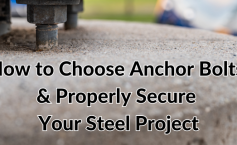As two of the most highly sought after steel grades on the market, many questions come up between the differences in 1018 and A36 steel. How different is A36 from 1018? Are they equivalent material grades? We thought it would be best to provide a comparrison for A36 and 1018 steel.
1018 Steel
1018 can come in cold drawn or hot rolled forms, but it is frequently purchased as a cold drawn product. We’ll assume 1018 is in its cold drawn state in this comparison. It typically comes in bar form in various sizes and shapes. 1018 steel has many positive features at a good price. 1018 steel is a mild low carbon steel with good ductility, toughness and strength qualities. 1018 steel can be easily welded using most welding processes. Capital Steel & Wire for example makes 1018 cold drawn bar in square, hexagon, round, and flat bar shapes and can cut it in any specified length.
A36 Steel
ASTM A36 steel is one of the most widely manufactured grades of steel bar, as it has many different applications across many industries. Like 1018, it can be hot rolled or cold drawn, but is typically hot rolled. So again, in this comparison, we’ll assume A36 is hot rolled. It comes in many different bar shapes including squares, rounds, rectangles, and is also often manufactured into channels, angles, I-Beams and H-Beams. It is also commonly manufactured as a steel plate product.
Chemical Properties
Chemically, A36 and 1018 are very similar.
| A36 | 1018 | |
| Iron, Fe | 99% | 98.81-99.26% |
| Carbon, C | 0.26% | 0.18% |
| Manganese, Mn | 0.75% | 0.6-0.9% |
| Phosphorus, P (max) | 0.04% | 0.04% |
| Sulfur, S (max) | 0.05% | 0.05% |
Mechanical Properties
Whether steel is hot rolled or cold drawn has a significant impact on the mechanical properties as noted in the table below.
| A36 | 1018 | |
| Tensile Strength | 58,000 psi | 63,000 psi |
| Yield Strength | 36,300 psi | 53,700 psi |
| Elongation (50 mm) | 20% | 15% |
Applications
1018 steel is used over A36 for applications that require machining, as it responds to machining fairly well. 1018 is most commonly used in high volume screw machine parts including shafts, spindels, pins and rods. A36 is often used as a mass steel product for the industrial and construction industries for making buildings, bridges, railroads, oil rigs and more. A36 is easy to weld with any standard welding methods, and with lower yield strengths than 1018, it is easier to bend.
Cost
Because cold drawing steel is more labor intensive and time intensive, the price of hot rolled products is significantly less than cold drawn. For products that do not require higher quality finishes and high strength and machinability characteristics, A36 makes a lot more sense than 1018 simply for the reduced cost alone.
Summary
As you can see, the mechanical and chemical properties of 1018, the machinability, and the surface finish of 1018 steel are all superior to A36. However, the big advantage of A36 is the overall cost. When deciding between the two steels, take into consideration the end application and the quantity that you will need.
| A36 | 1018 | |
| Strength | X | |
| Machinability | X | |
| Surface Finish | X | |
| Cost | X |





